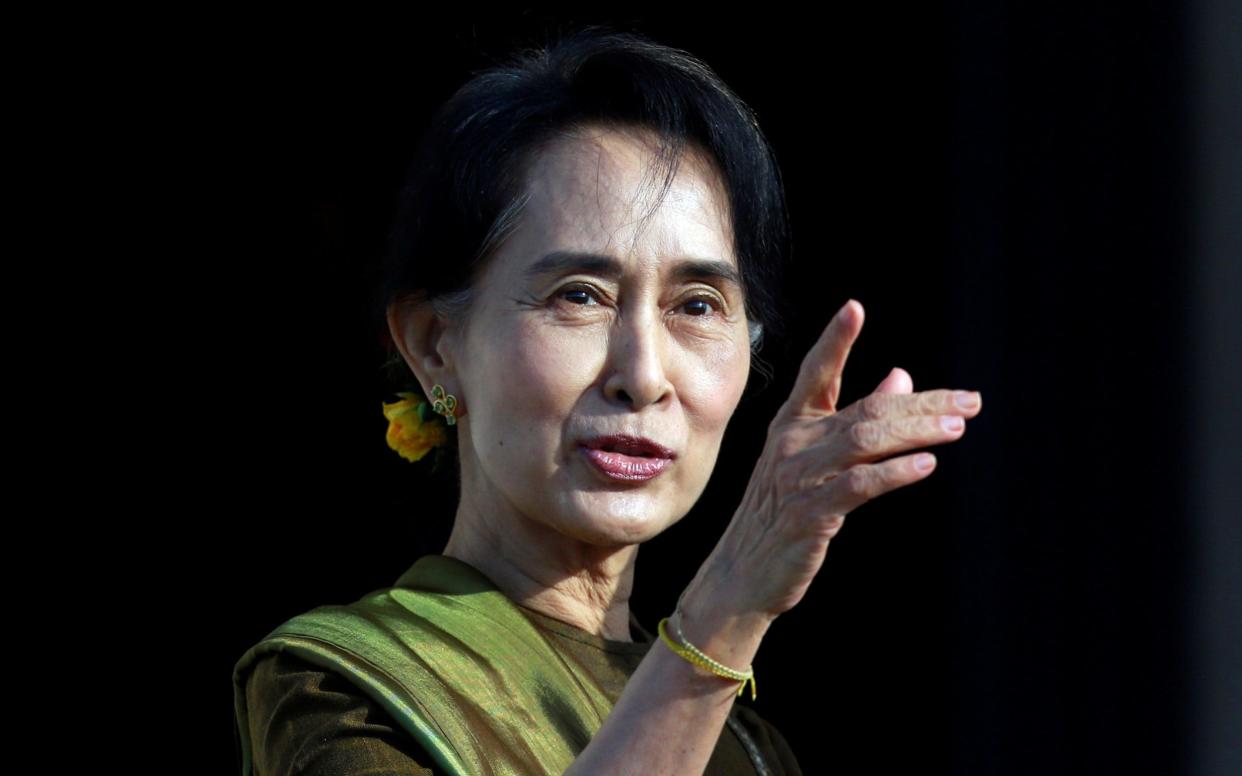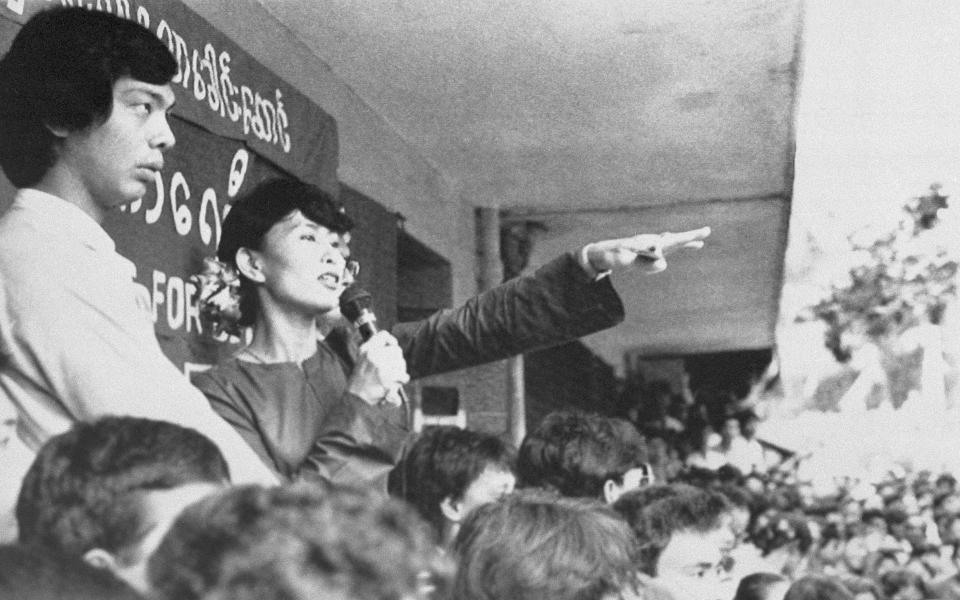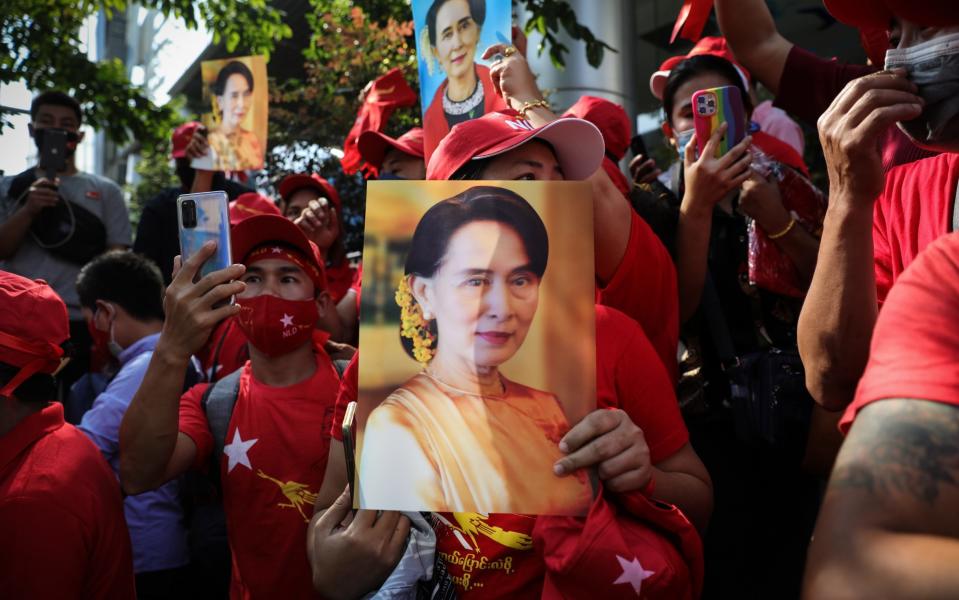Aung San Suu Kyi: Rise and fall of Myanmar's revolutionary hero turned 'arrogant' ruler

- Oops!Something went wrong.Please try again later.
- Oops!Something went wrong.Please try again later.
The virtues that once made Aung San Suu Kyi a saint of non-violent struggle led to a dramatic fall from grace in power – but she is still the most potent threat to Myanmar's would-be military dictators.
The daughter of General Aung San, a national hero widely credited with winning Burmese independence from British rule, Ms Suu Kyi always projected a sense of destiny – critics might call it entitlement – to lead her country.
Following a military coup in Myanmar on Monday morning, however, the nation's controversial figurehead was detained in an early morning raid – later urging her followers to take to the streets in protest.
Ms Suu Kyi was only two years old when her father was assassinated in 1947, and she was largely raised overseas by her diplomat mother.
After a privileged upbringing in India and the UK, Ms Suu Kyi studied politics, philosophy and economics at the University of Oxford before settling down with her husband, the historian Michael Aris, in Britain.
But when she returned to Burma to care for her ailing mother in 1988, she soon became embroiled in the country’s pro-democracy movement.
Ms Suu Kyi quickly became the leader of the movement for free elections, and by 1989 she had become so popular that the country's military authorities could no longer tolerate her presence.
She was arrested, and spent 15 of the next 21 years in detention with little to no contact with the outside world.
Her commitment to non-violence and refusal to bend in the face of intimidation earned her comparisons with Mahatma Gandhi and Nelson Mandela.
In 1991, while still under house arrest, she was awarded the Nobel Peace Prize "for her non-violent struggle for democracy and human rights”.

But her steely commitment to the political struggle came at great personal cost.
As a prisoner at her home in Yangon, Ms Suu Kyi was separated from Michael and their sons, Alexander and Kim, for years at a time.
When Michael was diagnosed with terminal cancer, the military government refused to grant him a visa to say goodbye to his wife in person – apparently hoping she would opt to leave the country instead.
Michael died in 1999 in Oxford, having seen his wife only five times since her original arrest.
In 2010, she was finally released and allowed to resume her political career in a political thaw that was heralded as a new dawn for democracy after 50 years of nearly unbroken military rule.
In 2015, Ms Suu Kyi led her National League for Democracy to a landslide victory in the country’s first free elections for a quarter of a century.
But the transition to democracy involved messy compromises that have marred her reputation.
The new constitution – carefully drafted by the military authorities to allow them to preserve as much of their power as possible – barred her from becoming president on the technicality that she had foreign-born children.
Instead, she became “state counsellor,” or de-facto national leader.
And critics pointed out that many abuses, including arrests of people criticising the government and intimidation of journalists, continued under Ms Suu Kyi's rule.

Her international reputation took an irreparable blow in 2017, when Myanmar’s military launched a bloody campaign of genocide against the Rohingya, a Muslim minority who live in Myanmar’s western Rakhine State.
As hundreds of thousands of refugees fled to neighbouring Bangladesh with detailed accounts of organised massacres and rape coordinated by local government officials, Ms Suu Kyi refused to speak out.
Her government even defended the massacres as legitimate “counter terrorism".
It was a popular stance with the public in Myanmar, and apologists argued that she had little choice: if she denounced the Army publicly, she would run the risk of another coup, and the complete collapse of Myanmar’s democratic experiment.
But others found it unforgivable.
“Those making excuses support her and want to defend her, but it is not rational,” said Kyaw Win, executive director of the UK-based Burma Human Rights Network.
“She stood up against the military, and that is what we expected her to do – to stand up with the same strength for a very important principle: against genocide.
"She had a principle moral duty to protect human life. Instead, she lost her reputation across the world.”
The stubbornness that had sustained her through her hard years of house arrest now looked more like arrogance and entitlement.
Her commitment to democracy and human rights was revealed to be caveated by a racist version of Burmese nationalism, deeply ingrained Islamophobia, and hard-nosed political calculation.
But Ms Suu Kyi remains widely popular inside Burma. She is greeted by well-wishers whenever she travels, and has been pro-active in speaking to the public as the country grapples with the Covid-19 pandemic.
Burma watchers were surprised when many voters from the country’s minority voters backed the NDL at November’s election, apparently still seeing it as a bulwark against a return to military rule.
“The arrogance, the entitlement that we see – people in Burma don’t see it that way. They see her as mother Suu. They see her as someone who is on their side and has their interests at heart," said Phil Robertson, a Burma expert at Human Rights Watch.
That will make it difficult for the generals to silence her – and difficult for Western governments who care about democracy in Myanmar to repudiate her, whatever her flaws.

